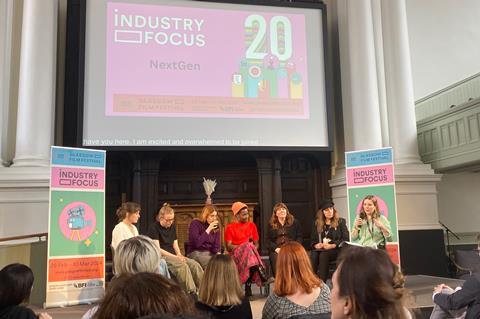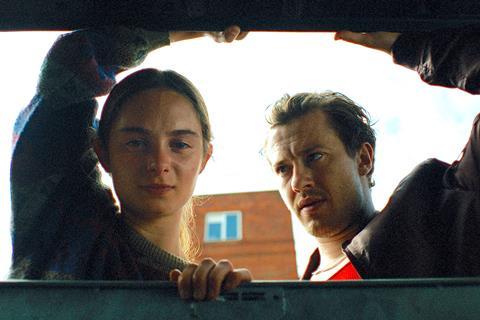
“Hallelujah,” was the message from BFI Filmmaking Fund director Mia Bays as she took to the stage at Glasgow Film Festival on March 7, to celebrate the next generation of UK talent.
“[Representation] has transformed over the past few years,” said Bays, who pointed towards the post-Times Up and MeToo movements and the impact of BFI’s diversity and inclusion targets as part of what has helped drive the opportunity for new voices to break through.
“One of my favourite terms is ‘opportunity hoarding’. There are lots of people who just sat on those opportunities, who have kept them. All of those conversations have led to this. Hallelujah,” she said.
Bays spoke enthusiastically about the Independent Film Tax Credit (IFTC) introduced this week, which will give UK films budgeted at under £15m an enhanced relief of 40%, up from the 25.5% for all budget levels.
“Boy, did we need that. We also need other support, across cinemas, festivals, all the ways we get films to audiences,” said Bays. “Props to everyone who helped open that door.”
Bays was on stage with BBC Film director Eva Yates, who noted: “The last two years have been as difficult as it could have been in the industry – Covid, strikes, everything that’s happened, the way the model has changed.”
However, she pointed towards the “amazing creative work has come through” despite these difficulties as speaking to the strength of the talent that exists in the UK.
“There are issues around representation still”
Bays and Yates were talking as part of GFF’s ‘NextGen’ panel alongside four filmmakers who have received a mix of BBC Film and BFI backing for their debuts: Hoard’s Luna Carmoon and Edge Of Summer’s Lucy Cohen, both playing at this year’s GFF, plus Scrapper’s Charlotte Regan and Girl’s Adura Onashile, a GFF 2023 premiere.

The all-female panel addressed how they felt about being labelled part of a new wave of female filmmaking talent emerging from the UK who have released acclaimed debuts in the past couple of years, along with the likes of How To Have Sex director Molly Manning Walker, Rye Lane’s Raine Allen Miller, Georgia Oakley’s Blue Jean, Aftersun’s Charlotte Wells and Mahalia Belo’s The End We Start From.
“There are issues with representation still. I think the recognition of that is really important,” said Onashile. “As a Black female filmmaker, it does get tiring to have those tags but I understand why they are there. As long as we have issues with opportunity and access in the industry, we will get those tags.
”There will come a time, it’s a long time coming, where we won’t need that. Hopefully we’ll just be talking about the films we’ve made. Of course, those identities are important to me as a filmmaker, but they’re not all I am. Sometimes it can feel a little bit ghettoising.”
“It’s a privilege to be compared to your peers and people who you admire, but we get wound up when we’re mentioned together all the time,” said Regan, in relation to Carmoon.
“We make such different films, we really love each other,” she explained, but they get fed up of being compared to one another “because we don’t speak posh”.
Cohen queried the term ‘wave’ in relation to the female voices coming, as “a wave comes and goes”.
Converting the buzz into sustainable careers was also a key concern for the filmmakers.
Carmoon pointed out a discrepancy between the offers her male contemporaries are getting who are at the same point in their career as herself. “We’re having this conversation – but where are the men in this position?
“We’ve had great support in making our debut films, but now it’s about sustainable careers. How does that work? What does that look like for female filmmakers?” added Cohen.
“Working class stories felt like a safari version of where I grew up”
“One thing about this ‘wave’ of filmmakers is that we’re being much more experimental, with British debuts in particular,” said Regan. ”There feels like there is much more support for that and audience for that, where there wasn’t before. We’re veering away from the ‘trauma porn’, which is very cool.”
“There was a period of time that I felt like when I was watching working-class stories, it felt like I was watching a safari version of where I grew up,” added Carmoon. “Who’s that film for? No one from where we’re from watches them.”
“There is a big question there about access and who goes to watch films, and I don’t think we’ve solved it,” noted Onashile.
“I hope that changing the films that get made will change the audiences that go to cinemas,” said Regan.

























No comments yet